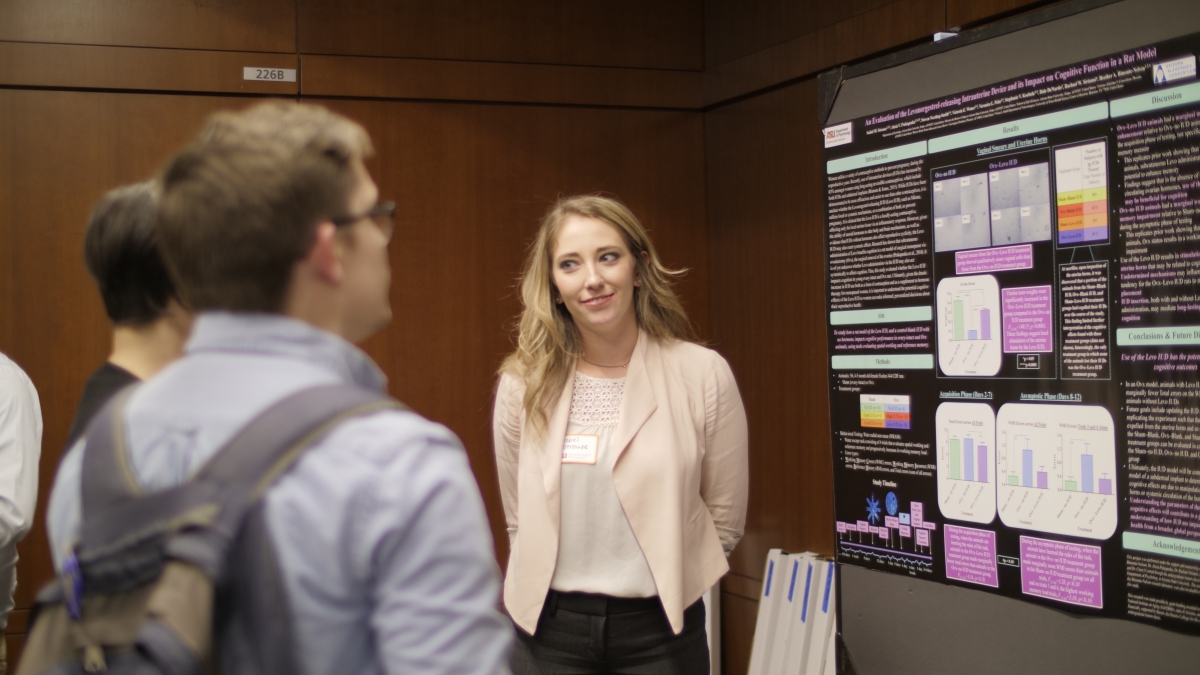ASU psychology students to host interdisciplinary research conference this spring

Psychology alumna Isabel Strouse practices presenting her award-winning research in front of her peers. Photo by Robert Ewing/ASU
Presenting research is a valuable skill that is essential for graduate school or a career in academia and research, and yet most students don’t know how to gain that experience.
This April 18, the International Psychology Honors Society, or Psi Chi, is hosting its annual Arizona Psychology Undergraduate Research Conference (AZPURC). This conference is an opportunity to present research findings in front of academic mentors and peers, as well as network with psychology research labs.
What makes the AZPURC conference special, however, is that it is run entirely by undergraduate students. The conference planning committee is led by Kristen Viscarra, a senior in psychology, and is supported by faculty advisers Madeline Meier, assistant professor of psychology; Lynda Mae, principal lecturer; and Michael McBeath, professor of psychology.
“Preparing for a research career is a rigorous endeavor that involves so many steps, and we wanted to provide a space that students felt comfortable presenting their research and growing,” Viscarra said.
The conference is structured similarly to an annual research conference with faculty speakers like assistant professors Kelsey Lucca and Jinni Su discussing their own developmental psychology research, and it features an opportunity for students to present research posters and findings to a broad audience. The goal is to replicate national and international conference experience as closely as possible to prepare students for those conferences later in their academic careers.
“AZPURC is a great way to prepare for graduate school as it teaches you skills such as public speaking, self-promotion and planning,” Viscarra added. “These skills don’t come naturally to many students, so having an open forum to practice is essential.”
AZPURC allows students to engage with the latest research and network with other students and faculty researchers who could later be mentors or write letters of recommendation for graduate school.
The conference theme this year is “Interdisciplinary Knowledge.” While AZPURC has traditionally been limited to psychology undergraduates, this year posters are being accepted from a wide range of disciplines.
“The best science is always interdisciplinary, and we wanted to make sure any student who wanted to participate was able to,” Viscarra said.
Students who are interested in submitting a poster or an abstract for this year’s conference can visit the Psi Chi website for more information. Submissions will be accepted until midnight March 31; submit your abstract here.
For students who are nervous about their first poster session or submitting their research to an academic conference, Psi Chi compiled its best tips and tricks for a successful poster session.
Psi Chi is an international honor society whose purpose is to encourage, stimulate and maintain excellence in scholarship of the individual members in all fields, particularly in psychology, and to advance the science of psychology. Its main goal is to encourage members to maintain a lifelong interest in exploring psychology and to participate in opportunities and experiences that allow them to grow, from mentorship to research.
“Psi Chi is a great organization here on campus to really just put yourself out there, learn about yourself, about psychology, about research and really to understand about what being on a team and being a high-achieving student is all about,” said Ronald Bessling, a senior in psychology and director of special programs for Psi Chi.
AZPURC will take place April 18 in Senita Ballroom B in the Student Pavilion on the Tempe campus.
More Science and technology

ASU professor shares the science behind making successful New Year's resolutions
Making New Year’s resolutions is easy. Executing them? Not so much.But what if we're going about it all wrong? Does real change…

ASU student-run podcast shares personal stories from the lives of scientists
Everyone has a story.Some are inspirational. Others are cautionary. But most are narratives of a person’s path, sometimes a…

The meteorite effect
By Bret HovellEditor's note: This story is featured in the winter 2025 issue of ASU Thrive.On Nov. 9, 1923, Harvey Nininger saw…